英语人教版必修5 Unit 1 Great Scientists Language points-1 课件(22张)
文档属性
| 名称 | 英语人教版必修5 Unit 1 Great Scientists Language points-1 课件(22张) |  | |
| 格式 | zip | ||
| 文件大小 | 1.3MB | ||
| 资源类型 | 教案 | ||
| 版本资源 | 人教版(新课程标准) | ||
| 科目 | 英语 | ||
| 更新时间 | 2019-02-01 21:00:26 | ||
图片预览

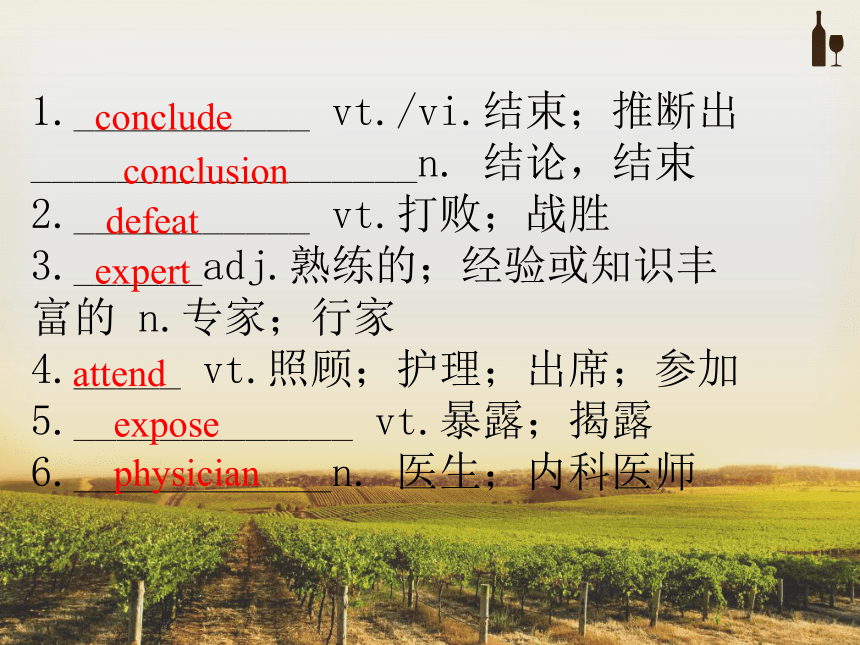
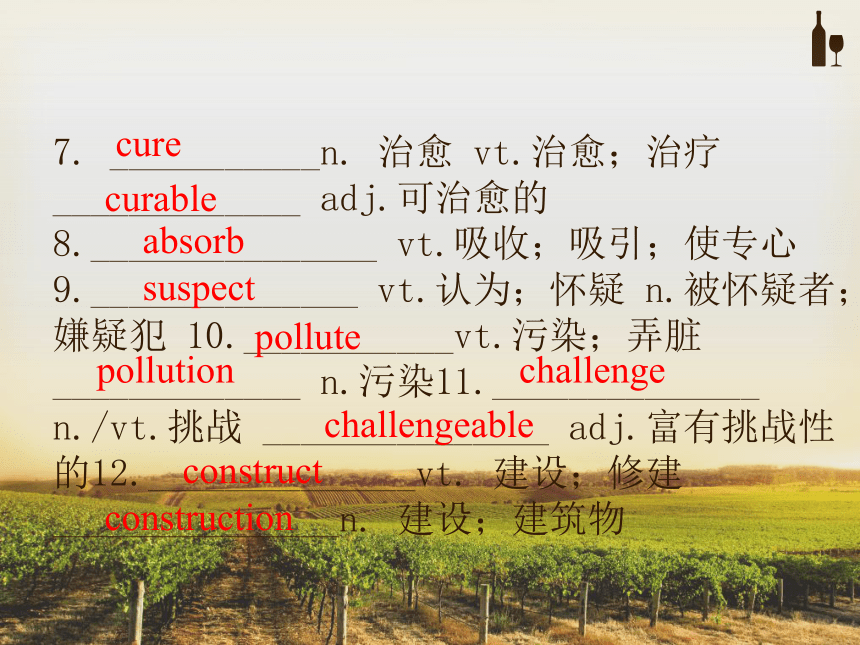
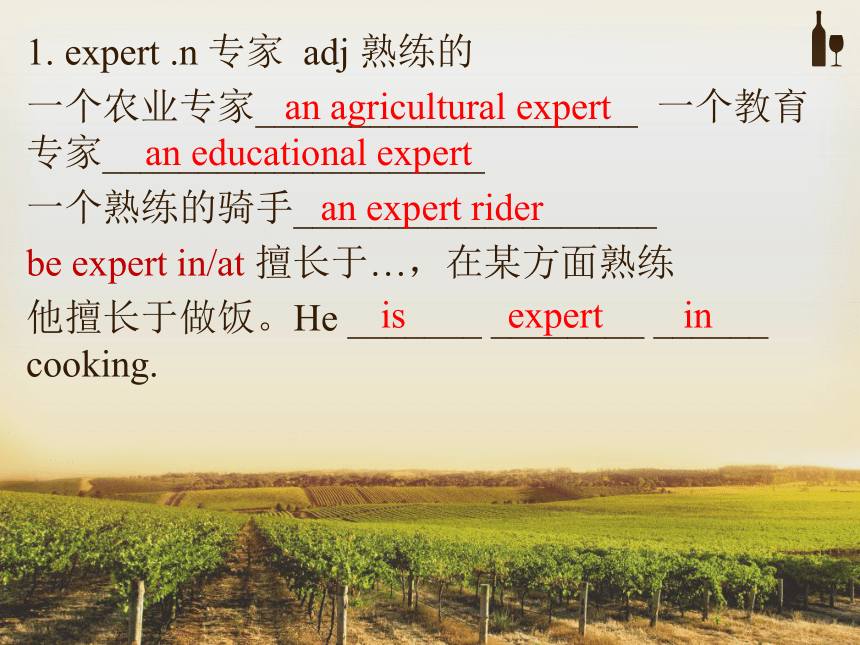

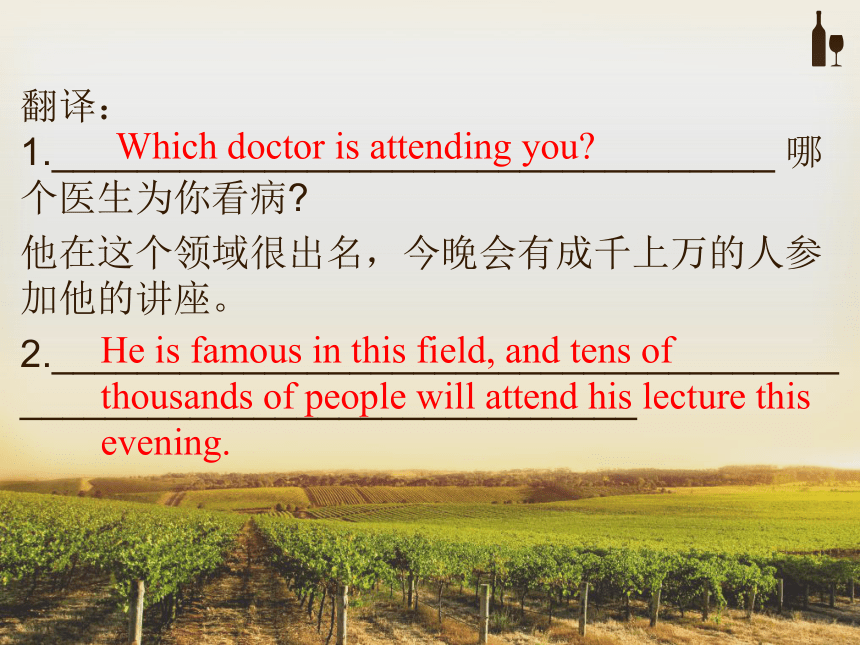
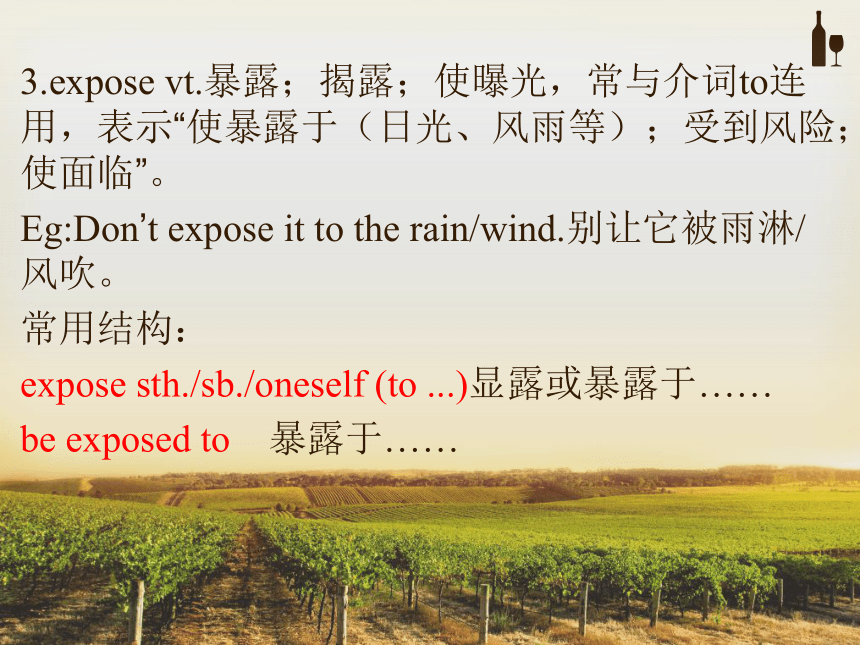
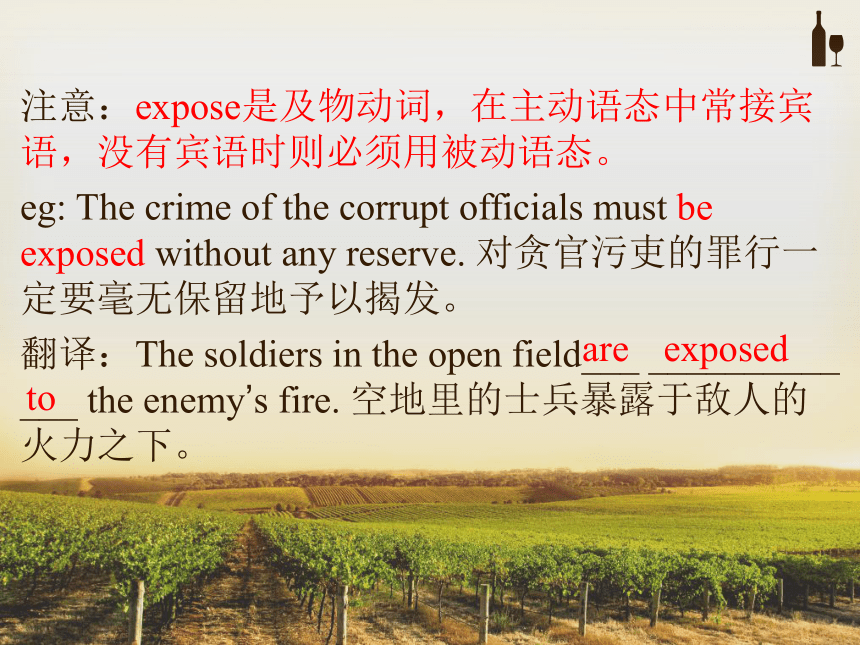
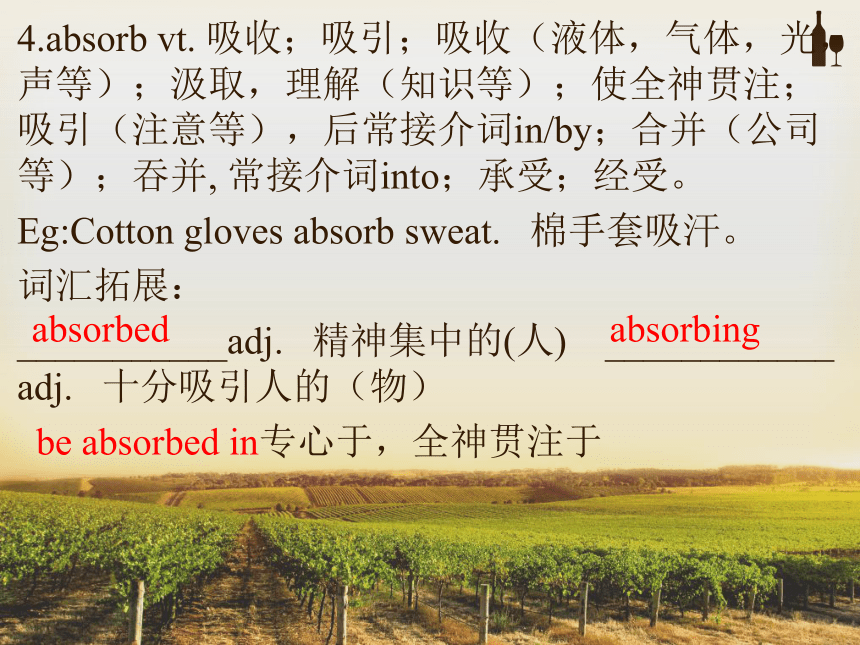
文档简介
课件22张PPT。Unit 1 Language points-1 1.___________ vt./vi.结束;推断出 __________________n. 结论,结束 2.___________ vt.打败;战胜
3.______adj.熟练的;经验或知识丰富的 n.专家;行家
4._____ vt.照顾;护理;出席;参加 5._____________ vt.暴露;揭露
6.____________n. 医生;内科医师 concludeconclusiondefeatexpertattendexposephysician 7. ___________n. 治愈 vt.治愈;治疗 _____________ adj.可治愈的8._______________ vt.吸收;吸引;使专心 9.______________ vt.认为;怀疑 n.被怀疑者;嫌疑犯 10.___________vt.污染;弄脏 _____________ n.污染11.______________ n./vt.挑战 _______________ adj.富有挑战性的12.______________vt. 建设;修建_______________n. 建设;建筑物
curecurableabsorbsuspectpollutepollutionchallengechallengeableconstructconstruction1. expert .n 专家 adj 熟练的
一个农业专家____________________ 一个教育专家____________________
一个熟练的骑手___________________
be expert in/at 擅长于…,在某方面熟练
他擅长于做饭。He _______ ________ ______ cooking.
an agricultural expertan educational expertan expert rider isexpertin2.attend v. 注意;留意;出席,到场;处理(与to连用)=do with;照看,照料=take care of =look after;参加
Eg: We’ll attend to the problem later. 稍后我们将关注这个问题。
常用结构:
_______________ 上学/上大学
attend a lecture/meeting 听讲座/出席会议
attend a wedding/ceremony 出席婚礼/参加典礼
_______________n. 出席;出席的人数;伺候;照料
attend school/college attendance 翻译:1.__________________________________ 哪个医生为你看病?
他在这个领域很出名,今晚会有成千上万的人参加他的讲座。
2.__________________________________________________________________
Which doctor is attending you? He is famous in this field, and tens of thousands of people will attend his lecture this evening.3.expose vt.暴露;揭露;使曝光,常与介词to连用,表示“使暴露于(日光、风雨等);受到风险;使面临”。
Eg:Don’t expose it to the rain/wind.别让它被雨淋/风吹。
常用结构:
expose sth./sb./oneself (to ...)显露或暴露于……
be exposed to 暴露于……
注意:expose是及物动词,在主动语态中常接宾语,没有宾语时则必须用被动语态。
eg: The crime of the corrupt officials must be exposed without any reserve. 对贪官污吏的罪行一定要毫无保留地予以揭发。
翻译:The soldiers in the open field___ __________ ___ the enemy’s fire. 空地里的士兵暴露于敌人的火力之下。
areexposedto4.absorb vt. 吸收;吸引;吸收(液体,气体,光,声等);汲取,理解(知识等);使全神贯注;吸引(注意等),后常接介词in/by;合并(公司等);吞并, 常接介词into;承受;经受。
Eg:Cotton gloves absorb sweat. 棉手套吸汗。
词汇拓展:
___________adj. 精神集中的(人) ____________ adj. 十分吸引人的(物)
be absorbed in专心于,全神贯注于
absorbedabsorbingEg: 1.So many good ideas! ____________________________ 这么多好主意!我很难一下子完全吸收。
2.______________________________________ 老人全神贯注地读这本书。
3.It’s too much for me to absorb all at once.The old man was completely absorbed in the book.Absorbed in reading this book is my grandfather.5.blame vt.责备;谴责;归咎于 n.责怪;(过失、过错等)责任
常用结构:
blame sb. for (doing) sth. 因(做)某事而指责某人
blame sth. on sb. 因某事而指责某人
sb. be to blame for(doing) sth. 因(做)某事某人应受到谴责
The student___________the teacher ______ his failure.
学生因失败而责怪老师。
The careless driver ____ ____ _________ for the traffic accident happening yesterday.
那个粗心的司机该为昨天发生的交通事故负责。blamedforistoblame温馨提示:
be to blame 应负责(无被动形式)
(1)单项填空
We all feel it is Jack as well as his wife that for their son’s bad performance at school.
A. are to blame B. is to be blamed
C. are to be blamed D. is to blameD6.link vt. 连接;联系 n. 环;连接;联系;纽带
常用结构:
link ...to/with 将……和……连接/联系起来
Eg:The highway _______Shanghai ____ Beijing. 这条公路连接着上海和北京。
_______________________________________
老朋友是连接往事的纽带。
linksto/withOld friends are a link with the past. 7. characteristic n.特色;特性;典型 adj.特有的,表示特性的;典型的
Kindness is one of his characteristics.
和善是他的特性之一。
易混辨析
character/characteristic
character n.性格,品质(本身具有的);角色,人物;字体,字符
characteristic n. 特点,特征(用以区别于其他事物的)
He proved himself a true gentleman and the beauty of his ________was seen at its best when he worked with others.
A. Characteristic B. character
C. Appearance D. temper
B5. cure vt.&n. 治愈,治疗;常用于“cure sb. for ...”结构中。
The doctor cured her for a bad cold.医生治好了她的重感冒。
It is possible to cure the sickness.治愈这种疾病是可能的。易混辨析
cure/treat/heal/recover
cure意为“治疗;治愈”,多用于指药物治疗并治愈某种疾病或改正不良习气。
treat为日常用语,意为“治疗;医治”,指治疗病人的全过程或活动。
heal意为“治愈(伤口);医治”,指治好外伤或烧伤后的部位,使伤口愈合,不用于指治疗感冒等疾病。
recover意为“痊愈,复原”,主要是指从病中痊愈了,常与from连用。重点词组1.put forward 提出(意见、建议);推荐;提名;将表拨快
Eg: He put forward a better plan.
他提出了一个更好的计划。
__________________________________
联想拓展
put in 打断;插嘴;进港 put off 推迟;延期
put on 穿;上演 put away 放好
put down写下 put on weight 发福;长胖
put out 生产;扑灭 put up 举起;张贴 put back 放回,送回He put forward a better plan.2.look into 调查;了解;研究;朝……里面看
联想拓展
look around/round/about 环顾四周
look after 照顾;照料 look back 回头看
look back to/upon/on 回顾;回想
look down upon 俯视;轻视 look for 寻求;寻找
look forward to 盼望 look on 旁观 look on/upon...as 把……看作 look out 往外看;注意;当心
look through 透过……看;浏览 look up 抬头看;查阅
温馨提示
look into与one’s face/eyes等连用,表示“注视”。
Eg: He looks into her face with great interest.
他饶有兴趣地注视着她的脸。
__________________________________________
让我们一起来研究这个问题,想出解决的办法。
Let’s look into the problem together and figure out a way to solve it.1.____________(absorb) in the film, she didn’t notice what happened around her.
2.Being exposed __________ too much violence does harm to the children.
3.A good solution to air pollution has been put _____________.
4.--The water was running all night long.
--Yes.It seemed that Tom was _________(blame).He was the last one to leave the lab.
5.We will link your PC___________ our network via the modern.
6.The______________(challenge) situation made her become strong.Absorbedtoforwardto blamewithchallenging
3.______adj.熟练的;经验或知识丰富的 n.专家;行家
4._____ vt.照顾;护理;出席;参加 5._____________ vt.暴露;揭露
6.____________n. 医生;内科医师 concludeconclusiondefeatexpertattendexposephysician 7. ___________n. 治愈 vt.治愈;治疗 _____________ adj.可治愈的8._______________ vt.吸收;吸引;使专心 9.______________ vt.认为;怀疑 n.被怀疑者;嫌疑犯 10.___________vt.污染;弄脏 _____________ n.污染11.______________ n./vt.挑战 _______________ adj.富有挑战性的12.______________vt. 建设;修建_______________n. 建设;建筑物
curecurableabsorbsuspectpollutepollutionchallengechallengeableconstructconstruction1. expert .n 专家 adj 熟练的
一个农业专家____________________ 一个教育专家____________________
一个熟练的骑手___________________
be expert in/at 擅长于…,在某方面熟练
他擅长于做饭。He _______ ________ ______ cooking.
an agricultural expertan educational expertan expert rider isexpertin2.attend v. 注意;留意;出席,到场;处理(与to连用)=do with;照看,照料=take care of =look after;参加
Eg: We’ll attend to the problem later. 稍后我们将关注这个问题。
常用结构:
_______________ 上学/上大学
attend a lecture/meeting 听讲座/出席会议
attend a wedding/ceremony 出席婚礼/参加典礼
_______________n. 出席;出席的人数;伺候;照料
attend school/college attendance 翻译:1.__________________________________ 哪个医生为你看病?
他在这个领域很出名,今晚会有成千上万的人参加他的讲座。
2.__________________________________________________________________
Which doctor is attending you? He is famous in this field, and tens of thousands of people will attend his lecture this evening.3.expose vt.暴露;揭露;使曝光,常与介词to连用,表示“使暴露于(日光、风雨等);受到风险;使面临”。
Eg:Don’t expose it to the rain/wind.别让它被雨淋/风吹。
常用结构:
expose sth./sb./oneself (to ...)显露或暴露于……
be exposed to 暴露于……
注意:expose是及物动词,在主动语态中常接宾语,没有宾语时则必须用被动语态。
eg: The crime of the corrupt officials must be exposed without any reserve. 对贪官污吏的罪行一定要毫无保留地予以揭发。
翻译:The soldiers in the open field___ __________ ___ the enemy’s fire. 空地里的士兵暴露于敌人的火力之下。
areexposedto4.absorb vt. 吸收;吸引;吸收(液体,气体,光,声等);汲取,理解(知识等);使全神贯注;吸引(注意等),后常接介词in/by;合并(公司等);吞并, 常接介词into;承受;经受。
Eg:Cotton gloves absorb sweat. 棉手套吸汗。
词汇拓展:
___________adj. 精神集中的(人) ____________ adj. 十分吸引人的(物)
be absorbed in专心于,全神贯注于
absorbedabsorbingEg: 1.So many good ideas! ____________________________ 这么多好主意!我很难一下子完全吸收。
2.______________________________________ 老人全神贯注地读这本书。
3.It’s too much for me to absorb all at once.The old man was completely absorbed in the book.Absorbed in reading this book is my grandfather.5.blame vt.责备;谴责;归咎于 n.责怪;(过失、过错等)责任
常用结构:
blame sb. for (doing) sth. 因(做)某事而指责某人
blame sth. on sb. 因某事而指责某人
sb. be to blame for(doing) sth. 因(做)某事某人应受到谴责
The student___________the teacher ______ his failure.
学生因失败而责怪老师。
The careless driver ____ ____ _________ for the traffic accident happening yesterday.
那个粗心的司机该为昨天发生的交通事故负责。blamedforistoblame温馨提示:
be to blame 应负责(无被动形式)
(1)单项填空
We all feel it is Jack as well as his wife that for their son’s bad performance at school.
A. are to blame B. is to be blamed
C. are to be blamed D. is to blameD6.link vt. 连接;联系 n. 环;连接;联系;纽带
常用结构:
link ...to/with 将……和……连接/联系起来
Eg:The highway _______Shanghai ____ Beijing. 这条公路连接着上海和北京。
_______________________________________
老朋友是连接往事的纽带。
linksto/withOld friends are a link with the past. 7. characteristic n.特色;特性;典型 adj.特有的,表示特性的;典型的
Kindness is one of his characteristics.
和善是他的特性之一。
易混辨析
character/characteristic
character n.性格,品质(本身具有的);角色,人物;字体,字符
characteristic n. 特点,特征(用以区别于其他事物的)
He proved himself a true gentleman and the beauty of his ________was seen at its best when he worked with others.
A. Characteristic B. character
C. Appearance D. temper
B5. cure vt.&n. 治愈,治疗;常用于“cure sb. for ...”结构中。
The doctor cured her for a bad cold.医生治好了她的重感冒。
It is possible to cure the sickness.治愈这种疾病是可能的。易混辨析
cure/treat/heal/recover
cure意为“治疗;治愈”,多用于指药物治疗并治愈某种疾病或改正不良习气。
treat为日常用语,意为“治疗;医治”,指治疗病人的全过程或活动。
heal意为“治愈(伤口);医治”,指治好外伤或烧伤后的部位,使伤口愈合,不用于指治疗感冒等疾病。
recover意为“痊愈,复原”,主要是指从病中痊愈了,常与from连用。重点词组1.put forward 提出(意见、建议);推荐;提名;将表拨快
Eg: He put forward a better plan.
他提出了一个更好的计划。
__________________________________
联想拓展
put in 打断;插嘴;进港 put off 推迟;延期
put on 穿;上演 put away 放好
put down写下 put on weight 发福;长胖
put out 生产;扑灭 put up 举起;张贴 put back 放回,送回He put forward a better plan.2.look into 调查;了解;研究;朝……里面看
联想拓展
look around/round/about 环顾四周
look after 照顾;照料 look back 回头看
look back to/upon/on 回顾;回想
look down upon 俯视;轻视 look for 寻求;寻找
look forward to 盼望 look on 旁观 look on/upon...as 把……看作 look out 往外看;注意;当心
look through 透过……看;浏览 look up 抬头看;查阅
温馨提示
look into与one’s face/eyes等连用,表示“注视”。
Eg: He looks into her face with great interest.
他饶有兴趣地注视着她的脸。
__________________________________________
让我们一起来研究这个问题,想出解决的办法。
Let’s look into the problem together and figure out a way to solve it.1.____________(absorb) in the film, she didn’t notice what happened around her.
2.Being exposed __________ too much violence does harm to the children.
3.A good solution to air pollution has been put _____________.
4.--The water was running all night long.
--Yes.It seemed that Tom was _________(blame).He was the last one to leave the lab.
5.We will link your PC___________ our network via the modern.
6.The______________(challenge) situation made her become strong.Absorbedtoforwardto blamewithchallenging
